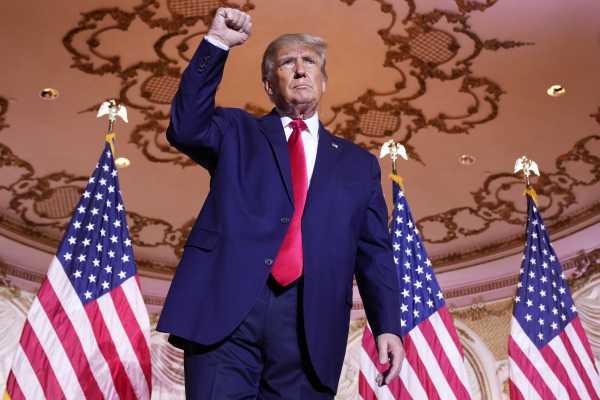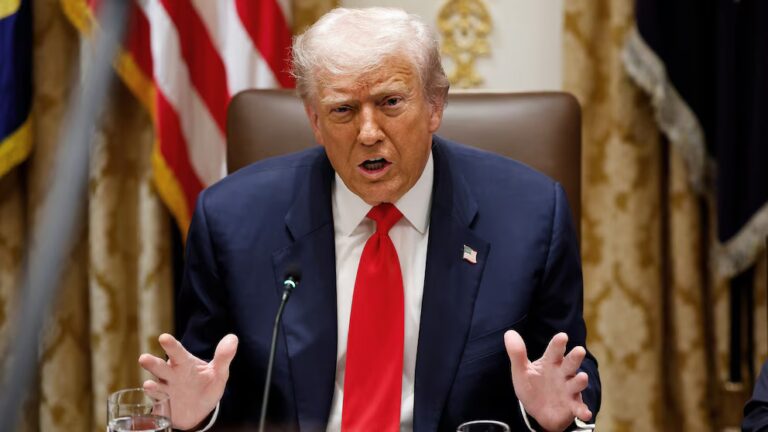
In Donald Trump’s first presidential campaign in 2016, it took him half a year to get his first endorsement from a federal elected official. In his second presidential campaign as an incumbent, he faced no real primary challenge, and the Republican Party almost entirely consolidated around him.
So far, his third presidential campaign is looking a lot more like his first than his second.
On Capitol Hill, the day after Trump announced his presidential campaign in an uninspired speech from the ballroom of his private club in Florida, members of his party mostly weren’t rushing to rally around him. His role in the GOP’s subpar performance in the midterms and his 2020 loss were still fresh on many of their minds. Instead, Trump has a motley mishmash of endorsements that is underwhelming compared to his stature as a former president whose support often proved pivotal among Republicans seeking congressional seats in 2022 primaries.
One of Trump’s early endorsers in 2016, Sen. Kevin Cramer (R-ND), was noncommittal. “I hope a lot of other people get in there, we have choices, and they all duke it out,” he told Vox. “As I’ve often said, he’s not entitled to the job. None of us are entitled to these jobs. We have to earn them every single time. In his case, I expect it will be hard fought.”
Sen. Ted Cruz (R-TX), who finished second to Trump in the highly contentious 2016 primary before eventually becoming an ally of the former president, also dodged the question. Cruz, considered a potential 2024 presidential candidate himself, told Vox, “I think we’ve accomplished a great deal with Donald Trump as president and if he’s the nominee, I’ll enthusiastically support him.”
Even Sen. Lindsey Graham (R-SC), a longtime Trump booster, offered qualified praise to the former president on Twitter Tuesday, saying, “If President Trump continues this tone and delivers this message on a consistent basis, he will be hard to beat.”
The only Senator to explicitly back Trump was Tommy Tuberville (R-AL), who told Vox on Wednesday, “I’m supporting him 100 percent.”
Trump’s longtime critics haven’t changed their tune. Sen. Mitt Romney, the GOP’s last presidential nominee before Trump and the only elected Republican to vote to remove the then president from office twice, thinks it’s time for a change. He told reporters that Republicans need “a leader of our party who is younger, has a bright vision for the future, and can get our country back on track, and President Trump has lost three in a row. And if we want to start winning, we need a new leader.” Romney didn’t explicitly offer any alternatives to Trump, telling reporters, “There are about 12 people I can think of that could be potential leaders of our party and presidential nominees.”
Trump has always been more popular in the House than in the Senate. Mitch McConnell (R-KY), whose relationship with Trump was never intimate and is now nonexistent, leads Senate Republicans, and the chamber has always had a significant number of prominent Trump skeptics. In contrast, the House has had a swarm of populist right-wingers who have flocked to the former president’s mantle, and its current leader, Kevin McCarthy (R-CA), has devoted himself to maintaining a good relationship with Trump.
But McCarthy has dodged on whether he supports Trump and, instead, the former president is left with a hodgepodge of support in the House. This includes diehards like Matt Gaetz and Marjorie Taylor Greene as well as more establishment Republicans like Tony Gonzales, who represents a border district in Texas, and Wesley Hunt, a congressmember-elect from Houston. The most prominent Republican in the House to endorse Trump’s presidential campaign so far is Elise Stefanik (R-NY), the chair of the Republican Conference, who has become an ardent Trump loyalist in recent years.
The result is that Trump is in an unusual position. Taken on its own, the number of endorsements that he has mustered more than a year before the first nominating contest is impressive. However, for a former president who essentially won the Republican nomination with acclamation in 2020, it’s rather lackluster. Many leaders in his party pine for Florida Gov. Ron DeSantis to run, and a host of other politicians are at least preparing the ground for a bid. After all, history is against Trump. No defeated president has come back to win reelection since Grover Cleveland (who, unlike Trump, won the popular vote every time he was on the ballot).
Related
Why a second Trump term would be even more dangerous than his first
Perhaps the best analogy is to Trump in that tenuous moment in the late winter of 2016, when he began to look like the favorite in the Republican presidential primary but was still politically vulnerable. Enough support has consolidated around him to show that he is a serious contender for the Republican nomination, if not the outright frontrunner.
But enough key figures in the party are holding back to make clear that there are deep reservations about nominating a politician who not only lost the last presidential election but helped instigate an armed attack on the Capitol to overturn it.
In 2016, by the time the reality that Trump could actually win struck the GOP, it was too late for opposition against Trump to consolidate. In a matter of weeks, as primary followed primary, he won enough delegates at the Republican National Convention to cause his opponents to drop out. This time, Trump has announced not just before the start of the 2024 election but while the 2022 election is still ongoing.
The endorsements that Trump has received in the past two days represent a floor. Most elected Republicans are still on the sidelines, and they have nothing but time to choose a candidate — Trump or someone else — in the 2024 primary.
Sourse: vox.com






